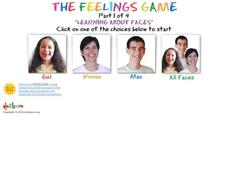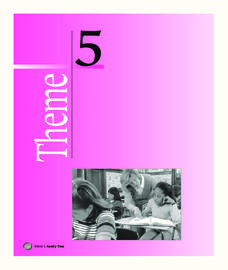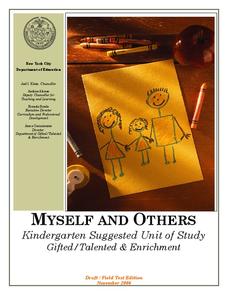Do2Learn
Social and Emotions Picture Cards
Social and emotional skills are a difficult task for people with autism to master. Help them become more aware of day-to-day emotions as well as how to express them with this massive set of picture cards.
Do2Learn
Social Play Action Figures
Three activities stem from one hands-on project designed to explore character traits. Scholars create an action figure that reflects their personality to teach others about themselves and role play conversational skills.
Do2Learn
Emotions Color Wheel
Support emotional development with a color wheel featuring a variety of feelings. Each expression comes equipped with an informative pop-up offering a picture, its etymology, a definition, and an example statement.
Do2Learn
Feelings Chart
Some days are better than others. Help autistic learners and other members of your class who have difficulty expressing their emotions with a feelings chart that presents a smiling face, a less smiling face, a neutral face, an unhappy...
Do2Learn
The Feelings Game
Discerning emotions and intent from facial expressions can be difficult for many learners, particular those with autism spectrum disorder. Help class members practice reading faces with an interactive resource that features three...
Keep Your Children Safe
Hurt Tracker Math
Boost emotional intelligence and division skills with a three-question learning exercise featuring two imaginary towns that record when citizens hurt, forgive, or punish one another. Using division, scholars calculate each problem to...
Keep Your Children Safe
Fleeting Happiness
Shed light onto the subject of happiness with a worksheet that focuses on how the emotion—much like other emotions—does not last forever. Scholars read brief passages and answer nine short-answer questions that examine their personal...
Keep Your Children Safe
What Is Happiness
Explore the feeling of happiness with a worksheet created to boost emotional intelligence. Scholars detail what makes them happy then draw a happy face.
Keep Your Children Safe
What Makes Me Afraid
Encourage scholars to be brave about feeling afraid with worksheet designed to enhance emotional intelligence. Learners share what makes them feel afraid then draw a face that appears scared.
Keep Your Children Safe
What is Sadness
Encourage emotional intelligence with a instructional activity examining the feeling of sadness. Scholars answer the question, "What makes you sad?" and draw a what their face looks like when they are sad.
Keep Your Children Safe
What Is Anger
Enhance emotional intelligence with a worksheet that allows scholars to explore the feeling of anger. Learners detail what makes them feel angry and draw an angry face.
International Boys' Schools Coalition
Empathy
Putting yourself in someone else's shoes is a common phrase we hear from time to time, but do children really understand? Explore empathy with elementary schoolers using these activities. Focusing on feelings and emotions, students role...
Talking with Trees
Empathy
Strengthen the skill to empathize with others with a worksheet that challenges scholars to match emotions—including happy, confused, sad—to one's body language.
Talking with Trees
What is Respect?
Inspire scholars to be the best they can be with a worksheet featuring the character trait, respect. Individuals read multiple scenarios, match their outcomes, and identify whether the behavior was respectful or disrespectful.
Pearson Longman
Emotions Reading
Explore the many types of feelings and how people express them with a lesson compiled of kid-friendly activities that spark critical thinking, self-reflection, and reinforce language and writing skills. Scholars delve into the variety of...
Houghton Mifflin Harcourt
Family Time: English Language Development Lessons (Theme 5)
Support English language development with a family-themed unit consisting of a series of lessons designed to get your scholars moving, looking, speaking, writing, and listening. Conversation topics include birthdays, family...
New York City Department of Education
Myself and Others
Self reflection is an important skill to reinforce in our children, and it's especially helpful to help them realize who they are in the context of their environment. A collection of lessons about self image and community encourage...
Council for the Curriculum, Examinations and Assessment
Feelings and Emotions
The focus of the second in a 10-session course on Social, Physical, Emotional, Cognitive and Spiritual (SPECS) health is on learning to express and manage feelings appropriately. Class members learn different ways of identifying, coping...
Council for the Curriculum, Examinations and Assessment
Feelings and Emotions
Eighth graders express their emotions with a set of activities about self reflection and feelings. With a set of emotion cards and a worksheet that details negative thought patterns, the resource empowers young learners to discover and...
Conflict Resolution Network
Empathy
Children are naturally friendly and communicative, but often have a hard time expressing their emotions in a clear and understandable way. Help them hone their communication skills with a set of activities based on creating empathy,...
Museum of Disability
Zoom!
Turn your class' focus on how wheelchairs assist individuals with disabilities to become more independent with this disabilities lesson plan. Scholars listen to a read aloud of the book, Zoom! by Robert Munsch, answer questions about key...
Houghton Mifflin Harcourt
All Together Now: English Language Development Lessons (Theme 1)
All Together Now is the theme of this series of ESL lessons. Provide support to your language learners through games, role play, stories, and discussions all about greeting others, giving commands, telling about themselves, and being...
Northern Ireland Curriculum
Feeling Good, Feeling Sad
Fill your classroom with grand conversations about emotions and the healthy ways to express them. Your scholars will create a collage, play a feelings game, read stories, and reflect on their daily feelings.
ESL Kid Stuff
Feelings & Emotions
Sometimes it can be hard to express emotions. Help little learners figure out what makes them happy, angry, sad, or scared with a lesson that focuses on feelings. It includes singing, drawing, matching flashcards, and more.

























